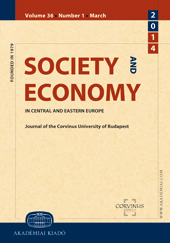Bargaining Power, Supplier-Reseller Networks in Practice: A Case Study of the Hungarian Meat Distribution System
Bargaining Power, Supplier-Reseller Networks in Practice: A Case Study of the Hungarian Meat Distribution System
Author(s): Zoltán Lakner, Attila RétiSubject(s): Economy, Business Economy / Management
Published by: Akadémiai Kiadó
Keywords: Hungary; meat industry; supplier-retailer relations;
Summary/Abstract: In era of intensifying competition on domestic market, the network-building and the relations between the channel members are gaining in importance. The aim of the current article is the analysis of cooperation between the members of an actual product-chain. The Hungarian meat-market can be characterised by intensive transitions both in market actors and product-structure. There is a decrease in the consumption of pork meat, and at the same time in this category, an increase in the number of processed meat producers. The transition in this industry highlights the importance of improving relations between the meat industrial producers and meat traders. In this paper, a framework is presented for developing a better supplier–seller relationship based on the opinions of more than two hundred meat trade specialists. The responses have been analysed by the use of single and multivariate statistics. The results of this research confirm that the overwhelming majority of traders consider the wide choice of products and flexibility a necessary precondition of success. Establishment of a cheap product-line is itself not enough as a marketing strategy for the achievement of a sustainable market advantage. The trade enterprises attach great importance to the marketing actions in partnership with meat industrial firms. The competition between meat suppliers is especially intensive in larger towns and in the Hungarian capital, Budapest. The partnership between market actors is regarded as an important factor of success among managers of dynamic, growth-oriented firms. Further, the level of conflicts between meat-processors and retailers diminishes with increasing competition. The level of co-operation and the sharing of market intelligence increases with the flexibility with time, quality and structure of deliveries of meat producers. These latter results were confirmed through the use of structural equation modelling.
Journal: Society and Economy. In Central and Eastern Europe ǀ Journal of the Corvinus University of Budapest
- Issue Year: 28/2006
- Issue No: 2
- Page Range: 137-145
- Page Count: 9
- Language: English

